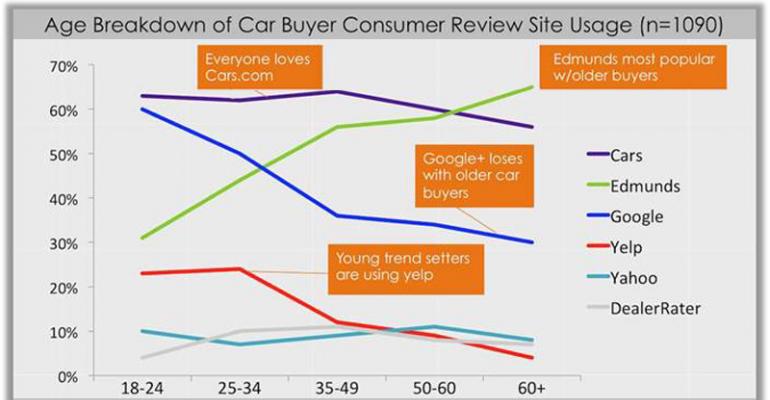Dealerships would be well-served to increase their Internet presence, as a growing number of consumers turn to online resources before making a vehicle purchase, a recent study reveals.
Marketing firm Digital Airstrike’s Spring 2013 Automotive Social Media and Reputation Trend Study finds 24% of consumers consider online vehicle-review websites to be the “most helpful” factor, outpacing the 15% of car buyers who consider dealership sites “most helpful.”
The study shows the most popular review sites are Cars.com, 61%; Edmunds, 54%; Google+Local, 37%; Yelp, 14%;, and Yahoo, 11%.
“We’re continuing to see an increase in consumers going to review sites to determine which dealer to do business with,” says Alexi Venneri, chief operating officer of Digital Air Strike.
Of the review sites that topped the study, Edmunds is more popular with older consumers, while Yelp attracts a younger audience. The others appeal to a wider range of ages.
As popular as review sites are, especially compared with dealer sites, car buyers most trust information gathered through social media when deciding what dealer to use for their next vehicle purchase.
The study shows a 59% probability that a consumer will trust a review from a Facebook friend more than reviews on other sites.
Venneri says dealers should not be afraid to ask consumers to favorably rate their stores or post a recommendation if they have a good experience. “Thirty percent (of car buyers) will do it; (dealers) just have to ask.”
Consumers also are looking at dealership ratings in search-engine results. Dealers on average have five review sites on the first page displayed.
Eighty-one percent of study participants say they “absolutely” look at these scores. “Even if they’re not clicking through (to the reviews), they are looking at them and seeing review sites in search results,” Venneri says.
Integrated Facebook ads, once panned by some auto makers as being ineffective, also are gaining traction. According to the study, clicks on dealership Facebook ads more than doubled from October 2012 to April 2013, from 16% to 39%. Additionally, the study indicates 45% of car buyers embrace the dedicated Facebook news feeds for brands.
Another growing trend among consumers is “checking in” while at a dealership to let their social-media contacts know they are planning to purchase a car. Venneri says dealers should encourage car buyers to check in by offering special discounts or promotions.
“Half of buyers check in at local businesses, so it’s another opportunity for dealers,” she says. “If you give them reason to check in, they will. Dealers need to have check-in strategy.”
Rewarding customer behavior also translates to dealership-run Facebook pages. Fifty-two percent of respondents to the Digital Airstrike study say they would be willing to “like” a dealership Facebook page in exchange for coupons or offers.
“Dealers should actively market that,” Venneri says.





